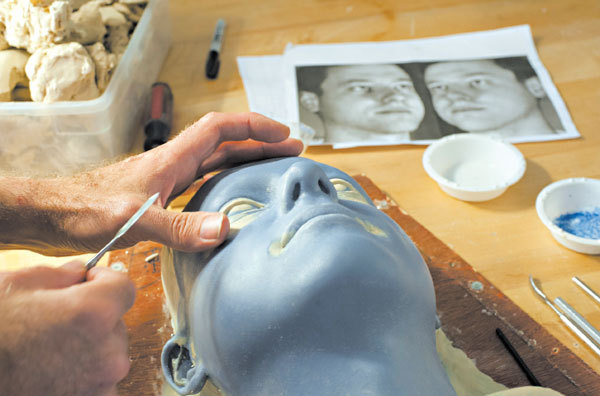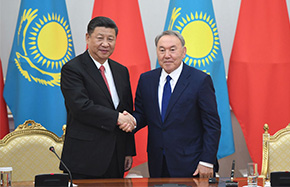Salvation, through avatars
2045 Initiative to build cyborgs
It is hard to imagine a day when the ideas championed by Dmitry Itskov, 32, a Russian multimillionaire and former online media magnate, will not seem far-fetched and unfeasible. His project, called the 2045 Initiative, for the year he hopes it is completed, envisions the mass production of lifelike, low-cost avatars that can be uploaded with the contents of a human brain, complete with all the particulars of consciousness and personality.
This would be a digital copy of your mind in a nonbiological carrier, a version of a fully sentient person that could live for hundreds or thousands of years.
 |
|
As a step toward his goal of creating avatars, Dmitry Itskov, a Russian multimillionaire, has commissioned a robotic copy of his own head. Brandon Thibodeaux for The New York Times |
Yet he has the attention, and in some cases the avid support, of august figures at Harvard University and the Massachusetts Institute of Technology and leaders in fields like molecular genetics and neuroprosthetics. Roughly 30 speakers from these and other disciplines will appear at the second annual 2045 Global Future Congress on June 15 and 16 in Lincoln Center in Manhattan.
Attendees will hear people like Sir Roger Penrose, an emeritus professor of mathematical physics at Oxford, who appears on the 2045.com Web site with a video teaser about "the quantum nature of consciousness," and George M. Church, a genetics professor at Harvard Medical School, whose video on the site concerns "brain healthspan extension." As these videos suggest, scientists are taking tiny, incremental steps toward melding human and machine all the time. Ray Kurzweil, the futurist and now Google's director of engineering, argued in "The Singularity Is Near," a 2005 book, that technology is advancing exponentially and that "human life will be irreversibly transformed" to the point that there will be no difference between "human and machine or between physical and virtual reality."
Technological achievements have continued their march since he wrote the book - from creating computers that can outplay humans (like Watson, the "Jeopardy" winner from I.B.M.) to technology that tracks a game player's heartbeat and perhaps his excitement (like the new Kinect) to digital tools for those with disabilities (like brain implants that can help quadriplegics move robotic arms).
"This is no more wild than in the early '60s, when we saw the advent of liver and kidney transplants," said Martine A. Rothblatt, founder of United Therapeutics, a biotech company that makes cardiovascular products. "People said at the time, 'This is totally crazy.' Now, about 400 people have organs transplanted every day."
Mr. Itskov says he will invest at least part of his fortune in any startup ventures that promote his vision - he says he has already spent $3 million of his own money so far - but the primary goal with 2045 is not to become richer. He maintains that his avatars would not just end world hunger - because a machine needs maintenance but not food - but that they would also usher in a more peaceful and spiritual age.
"We need to show that we're actually here to save lives," he said. "To help the disabled, to cure diseases, to create technology that will allow us in the future to answer some existential questions. Like what is the brain, what is life, what is consciousness and, finally, what is the universe?"
Mr. Itskov was raised in Bryansk, a city about 370 kilometers southwest of Moscow, with a father who directed musical theater and a mother who was a schoolteacher. He attended the Plekhanov Russian Academy of Economics, where he met his future business partner, Konstantin Rykov. In 1998, Mr. Rykov started an e-zine with an English-language obscenity for a name. Mr. Itskov came on board the next year. They built tarakan.ru, a blog about the Russian Internet, and an online newspaper, Dni.ru. Game sites and other online newspapers would follow, along with a print magazine, a book publisher and Internet TV channel.
But at the age of 25, Mr. Itskov started to have the symptoms of a midlife crisis. He anticipated the regrets he might have as an old man - the musical instruments unlearned, the books unread. The standard span of 80 or so years suddenly seemed woefully inadequate. And the more he contemplated the world, the more broken it seemed.
He reasons we must change our minds, or give them a chance to "evolve." Before our minds can evolve, though, we need a new paradigm of what it means to be human. That requires a transition to a world where most people aren't consumed by the basic questions of survival.
Hence, avatars. The laws of supply and demand abide in Mr. Itskov's utopia, and he assumes that once production of avatars is ramped up, costs will plunge. He also assumes that charities now devoted to feeding, clothing and healing the poor will focus on the goal of making and distributing affordable bodies, which in this case means machines.
For now, just acquiring a lifelike robotic head is a splurge. What Mr. Itskov describes as the most sophisticated mechanical head in history, a replica of Mr. Itskov from the neck up, is under construction in Plano, Texas, home of Hanson Robotics, a company founded by David Hanson, who has a doctorate in interactive arts and engineering.
"Most robotic heads have 20 motors," Mr. Hanson said. "Mine have 32. This one will have 36. So, more facial expressions, simulating all the major muscle groups."
The even more remarkable expectation is that while Mr. Itskov is in another room, sitting before a screen with sensors to pick up his every movement, the head will be able to reproduce his expressions and voice. "He's controlling that robot, controlling its gestures, its expression and its speaking with his voice in real time," Mr. Hanson says.
Mr. Itskov sees his futuristic initiative as a present-day end in itself. "Our leaders are focused on stability," he said. "We don't have something which will unite the whole of humanity. The initiative will inspire people."
Do people want to live forever? If yes, would they like to spend that eternity in a "nonbiological carrier"? What happens to your brain once it's uploaded? What about your body? If you could choose when to acquire an avatar body, what's the ideal age to acquire it? Can avatars have sex?
These are just a few of the dozens of questions raised by the 2045 Initiative. (Yes, avatars can have sex, Mr. Itskov says, because "an artificial body can be designed to receive any sensations.")
If Mr. Itskov succeeds, history will remember him as a daring visionary whose money and energy redefined life in ways that solved some of the world's most intransigent problems.
If he fails, the word "cockamamie" is sure to show up in his obituary.
Andrew E. Kramer contributed reporting from Moscow.
The New York Times


























